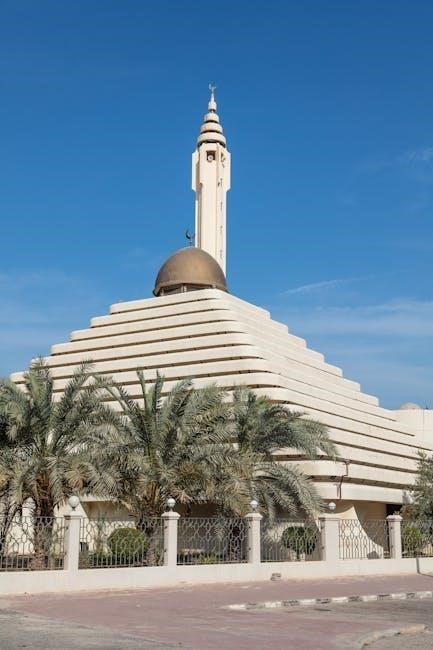Azkar Al Sabah are morning supplications in Islam‚ offering blessings‚ protection‚ and spiritual growth. This collection of prayers is recited after dawn‚ fostering a connection with Allah. A PDF guide is available for easy access.

What are Azkar Al Sabah?
Azkar Al Sabah‚ or “Morning Remembrances‚” are a collection of Islamic supplications and prayers recited at dawn. These invocations are rooted in the Sunnah and the Quran‚ emphasizing gratitude‚ protection‚ and spiritual growth. They include specific verses like Surah Al-Fatiha‚ Al-Ikhlas‚ Al-Falaq‚ and Al-Nas‚ along with various duas and salawat. The practice is highly recommended in Islam to seek Allah’s blessings‚ guidance‚ and refuge from harm. Azkar Al Sabah are typically recited after the Fajr prayer‚ fostering a strong spiritual connection and setting a righteous tone for the day. Many resources‚ including PDF guides‚ are available to help Muslims learn and practice these morning supplications effectively‚ ensuring consistency and accuracy in their recitation.

Importance of Morning Supplications in Islam
Morning supplications‚ or Azkar Al Sabah‚ hold a significant place in Islamic worship‚ emphasizing spiritual connection and gratitude. Rooted in the Sunnah and Quran‚ these prayers are recited at dawn to seek Allah’s blessings‚ protection‚ and guidance. They are a means to start the day with a righteous intention‚ fostering a sense of closeness to Allah. The practice is highly encouraged as it reflects a believer’s commitment to faith and serves as a shield against evil. By reciting specific verses like Surah Al-Fatiha‚ Al-Ikhlas‚ Al-Falaq‚ and Al-Nas‚ Muslims seek refuge‚ strength‚ and spiritual growth. Morning supplications also cultivate gratitude and mindfulness‚ setting a positive tone for the day ahead. The PDF guide provides a structured format‚ making it easier for believers to adopt and maintain this beautiful practice consistently.

Overview of the Azkar Al Sabah PDF
The Azkar Al Sabah PDF is a comprehensive guide to morning supplications‚ offering a structured collection of prayers‚ verses‚ and reflections. Available for free download‚ this resource is designed to aid Muslims in incorporating these supplications into their daily routine. It includes translations‚ transliterations‚ and explanations of key prayers like Surah Al-Fatiha‚ Al-Ikhlas‚ Al-Falaq‚ and Al-Nas. The PDF also provides insights into the significance of each supplication‚ helping believers understand their meanings and benefits. This accessible format ensures that users can easily follow and recite the Azkar Al Sabah‚ fostering consistency and devotion. Whether for personal use or sharing‚ the PDF serves as an invaluable tool for enhancing spiritual practice and deepening one’s connection with Allah.

Significance of Azkar Al Sabah
Azkar Al Sabah holds profound significance as it offers protection‚ blessings‚ and spiritual peace. Reciting these morning supplications strengthens one’s connection with Allah‚ fostering mindfulness and setting a positive tone for the day.
Benefits of Reciting Morning Supplications
Reciting Azkar Al Sabah offers numerous spiritual and practical benefits. It provides divine protection from harm‚ strengthens faith‚ and fosters a sense of gratitude. Morning supplications also bring peace of mind and set a positive tone for the day. They are a means of seeking Allah’s blessings‚ guidance‚ and forgiveness. Regular recitation enhances spiritual growth and helps in developing a closer connection with Allah. Additionally‚ these supplications are a form of worship that can be performed anywhere‚ making them accessible to everyone. The practice is rooted in Islamic tradition‚ with many supplications recommended by the Prophet Muhammad (peace be upon him). By incorporating Azkar Al Sabah into one’s routine‚ individuals can experience both spiritual and emotional enrichment‚ aligning their daily life with Islamic teachings and values. The PDF guide serves as a convenient resource to learn and recite these supplications accurately.
How Azkar Al Sabah Differ from Evening Supplications

Azkar Al Sabah and evening supplications serve distinct purposes‚ with morning supplications focusing on seeking blessings‚ guidance‚ and protection for the day ahead. They are typically recited after dawn‚ emphasizing gratitude and the pursuit of righteousness. In contrast‚ evening supplications often center on expressing thanks for the day’s blessings and seeking forgiveness and protection for the night. The specific prayers and surahs‚ such as Al-Fatiha‚ Al-Ikhlas‚ Al-Falaq‚ and Al-Nas‚ may overlap but are contextualized differently based on the time of day. Morning supplications are also linked to the Sunnah of the Prophet Muhammad (peace be upon him)‚ who encouraged believers to start their day with remembrance of Allah. The Azkar Al Sabah PDF highlights these distinctions‚ providing a structured guide for reciting these supplications at the appropriate times‚ ensuring spiritual balance and harmony in daily life.
Scientific and Spiritual Benefits of Morning Dhikr
Morning Dhikr‚ as outlined in the Azkar Al Sabah PDF‚ offers profound scientific and spiritual benefits. Spiritually‚ it strengthens one’s connection with Allah‚ fostering inner peace and mindfulness. Scientifically‚ studies suggest that reciting morning supplications can reduce stress‚ improve mental clarity‚ and enhance emotional well-being. The rhythmic repetition of certain prayers can lower cortisol levels‚ promoting relaxation. Additionally‚ the early morning timing aligns with the body’s natural circadian rhythm‚ making it an ideal time for reflection and meditation. This practice also boosts memory and cognitive function‚ as it involves the repetition of specific verses and supplications. The combination of spiritual elevation and mental health benefits makes morning Dhikr a holistic practice that enriches both the soul and the mind‚ as detailed in the Azkar Al Sabah guide.
Key Supplications in Azkar Al Sabah
The core supplications in Azkar Al Sabah include Surah Al-Fatiha‚ Al-Ikhlas‚ Al-Falaq‚ and Al-Nas. These are central to the morning prayers‚ along with Salawat and Durood‚ enhancing their significance.
Surah Al-Fatiha and Its Role in Morning Supplications
Surah Al-Fatiha‚ the opening chapter of the Quran‚ holds a central place in Azkar Al Sabah. It is often recited multiple times during morning supplications‚ as it is believed to provide divine guidance and protection. This Surah is considered a comprehensive prayer‚ summarizing the essence of worship‚ praise‚ and seeking Allah’s blessings. Reciting Al-Fatiha in the morning is a Sunnah‚ as it aligns with the Prophet’s (peace be upon him) practice of beginning the day with gratitude and devotion. Many scholars emphasize its importance‚ citing Hadiths that highlight its merits‚ such as being a cure for spiritual and physical ailments. In the Azkar Al Sabah PDF‚ Surah Al-Fatiha is frequently included‚ often followed by other Surahs like Al-Ikhlas‚ Al-Falaq‚ and Al-Nas‚ to create a holistic morning prayer routine. This practice is not only a means of worship but also a way to seek refuge and blessings at the start of the day.

Surah Al-Ikhlas‚ Al-Falaq‚ and Al-Nas
Surah Al-Ikhlas‚ Al-Falaq‚ and Al-Nas are three concise yet powerful chapters of the Quran‚ often recited together in Azkar Al Sabah. Surah Al-Ikhlas emphasizes the oneness of Allah‚ serving as a declaration of monotheism and a means of seeking divine protection. Surah Al-Falaq and Al-Nas are specifically sought for refuge from evil‚ harm‚ and negative influences. Together‚ these Surahs are believed to provide spiritual safeguarding and blessings‚ making them integral to morning supplications. They are frequently included in the Azkar Al Sabah PDF‚ often alongside other prayers and invocations‚ to create a comprehensive morning worship routine. Reciting these Surahs is a Sunnah practice‚ recommended for their profound spiritual and protective benefits. Their inclusion in the Azkar Al Sabah PDF highlights their importance in starting the day with faith‚ protection‚ and a strong connection to Allah.

Salawat and Durood in Morning Azkar
Salawat and Durood are integral components of Azkar Al Sabah‚ reflecting the Islamic practice of sending blessings upon the Prophet Muhammad (peace be upon him). These prayers are expressions of love‚ reverence‚ and gratitude. Reciting Salawat and Durood in the morning is a Sunnah‚ following the Prophet’s example and the teachings of his companions. They are believed to bring spiritual rewards‚ divine mercy‚ and blessings. The Azkar Al Sabah PDF often includes specific formulas for Durood‚ which are recited to seek Allah’s favor and protection. By incorporating these into morning supplications‚ believers strengthen their connection to the Prophet and align themselves with Islamic traditions. This practice is highly recommended to start the day with a focus on faith and spirituality‚ seeking both worldly and eternal benefits. The PDF guides provide easy access to these prayers‚ ensuring they are recited correctly and consistently.
How to Incorporate Azkar Al Sabah into Daily Life
Incorporating Azkar Al Sabah into your daily routine begins with understanding the significance of these morning supplications. Start by setting a consistent time each morning‚ ideally after the Fajr prayer‚ to recite the recommended prayers. Utilize the Azkar Al Sabah PDF guide to access structured supplications and benefit from the scientific and spiritual advantages they offer. Establishing a dedicated spot for recitation and setting reminders can aid in maintaining consistency. Familiarize yourself with key supplications like Surah Al-Fatiha and understand how they differ from evening prayers‚ focusing on their unique benefits. By following the guide and staying committed‚ you can seamlessly integrate Azkar Al Sabah into your daily life‚ enhancing both your mental clarity and spiritual connection.

Best Times to Recite Morning Supplications
The best times to recite Azkar Al Sabah are during the early morning hours‚ particularly after the Fajr prayer and before sunrise. This period‚ known as “Subhe Sadik‚” is highly recommended in Islamic traditions for supplications. Reciting these prayers immediately after waking up helps cultivate mindfulness and gratitude. The Quran emphasizes‚ in Surah Al-Quran 76:025‚ the importance of mentioning Allah’s name in the morning and evening. Additionally‚ the Messenger of Allah (peace be upon him) encouraged reciting specific supplications during these times for divine protection and blessings. Consistency in these practices enhances their spiritual benefits and strengthens one’s connection with Allah. Using the Azkar Al Sabah PDF as a guide ensures that you can follow the recommended supplications and adhere to the optimal timings for maximum spiritual gain.
Step-by-Step Guide to Performing Azkar Al Sabah

Performing Azkar Al Sabah involves a structured approach to maximize its spiritual benefits. Begin by waking up before dawn and performing the Fajr prayer‚ as this sets a sacred tone for the day. Immediately after the prayer‚ recite the morning adhkar‚ starting with the declaration of faith‚ “There is no god but Allah‚” followed by praising Allah and seeking His forgiveness; Recite Surah Al-Fatiha‚ Surah Al-Ikhlas‚ Surah Al-Falaq‚ and Surah Al-Nas‚ as these are highly recommended. Then‚ recite the prescribed supplications‚ such as “Rabbighfir li” and “Allahumma ajirni‚” seeking protection and guidance. Conclude with Salawat and durood upon the Prophet Muhammad (peace be upon him). Using the Azkar Al Sabah PDF as a reference ensures you follow the correct order and wording. Consistency in this practice strengthens faith and brings divine blessings.
The Role of Consistency in Gaining Maximum Benefits
Consistency is paramount for deriving the full spiritual and emotional benefits of Azkar Al Sabah. Regular recitation strengthens one’s connection with Allah‚ fostering a sense of discipline and mindfulness. By incorporating these supplications into daily routines‚ individuals cultivate a habit of gratitude and reliance on divine guidance. The Prophet Muhammad (peace be upon him) emphasized the importance of persistence in worship‚ as it pleases Allah and brings spiritual elevation. Even a brief but consistent practice yields greater rewards than irregular‚ lengthy sessions. Using the Azkar Al Sabah PDF as a guide helps maintain regularity‚ ensuring the supplications are recited correctly and at the optimal times. Over time‚ this consistency leads to increased inner peace‚ improved mental clarity‚ and heightened awareness of Allah’s presence in daily life‚ ultimately transforming the heart and soul.
